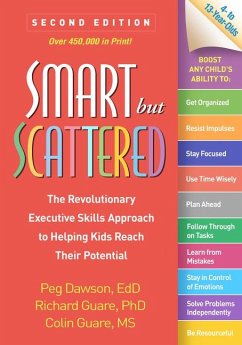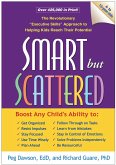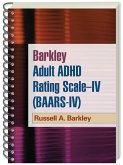Peg Dawson (Center for Learning and United Sta Attention Disorders, Richard Guare, Colin Guare
Smart But Scattered
The Revolutionary Executive Skills Approach to Helping Kids Reach Their Potential
Peg Dawson (Center for Learning and United Sta Attention Disorders, Richard Guare, Colin Guare
Smart But Scattered
The Revolutionary Executive Skills Approach to Helping Kids Reach Their Potential
- Gebundenes Buch
- Merkliste
- Auf die Merkliste
- Bewerten Bewerten
- Teilen
- Produkt teilen
- Produkterinnerung
- Produkterinnerung
This encouraging guide is grounded in research on the crucial brain-based skills that 4- to 13-year-olds need to get organized, stay focused, and control their impulses and emotions.
Andere Kunden interessierten sich auch für
![Smart But Scattered Smart But Scattered]() Peg Dawson (Center for Learning and United Sta Attention DisordersSmart But Scattered29,99 €
Peg Dawson (Center for Learning and United Sta Attention DisordersSmart But Scattered29,99 €![Smart But Scattered Smart But Scattered]() Peg Dawson (Center for Learning and United Sta Attention DisordersSmart But Scattered16,99 €
Peg Dawson (Center for Learning and United Sta Attention DisordersSmart But Scattered16,99 €![Smart But Scattered Teens Smart But Scattered Teens]() Richard GuareSmart But Scattered Teens26,99 €
Richard GuareSmart But Scattered Teens26,99 €![Smart But Scattered--And Stalled Smart But Scattered--And Stalled]() Richard GuareSmart But Scattered--And Stalled29,99 €
Richard GuareSmart But Scattered--And Stalled29,99 €![Barkley Adult ADHD Rating Scale--IV (BAARS-IV) Barkley Adult ADHD Rating Scale--IV (BAARS-IV)]() Russell A. Barkley (Virginia Commonwealth University School of MediBarkley Adult ADHD Rating Scale--IV (BAARS-IV)218,99 €
Russell A. Barkley (Virginia Commonwealth University School of MediBarkley Adult ADHD Rating Scale--IV (BAARS-IV)218,99 €![The Smart But Scattered Guide to Success The Smart But Scattered Guide to Success]() Peg Dawson (Center for Learning and United Sta Attention DisordersThe Smart But Scattered Guide to Success29,99 €
Peg Dawson (Center for Learning and United Sta Attention DisordersThe Smart But Scattered Guide to Success29,99 €![Taking Charge of Adult ADHD Taking Charge of Adult ADHD]() Russell A. Barkley (Virginia Commonwealth University School of MediTaking Charge of Adult ADHD29,99 €
Russell A. Barkley (Virginia Commonwealth University School of MediTaking Charge of Adult ADHD29,99 €-
-
-
This encouraging guide is grounded in research on the crucial brain-based skills that 4- to 13-year-olds need to get organized, stay focused, and control their impulses and emotions.
Hinweis: Dieser Artikel kann nur an eine deutsche Lieferadresse ausgeliefert werden.
Hinweis: Dieser Artikel kann nur an eine deutsche Lieferadresse ausgeliefert werden.
Produktdetails
- Produktdetails
- Verlag: Guilford Publications
- 2 ed
- Seitenzahl: 328
- Erscheinungstermin: 19. November 2024
- Englisch
- Abmessung: 254mm x 178mm x 21mm
- Gewicht: 826g
- ISBN-13: 9781462555741
- ISBN-10: 1462555748
- Artikelnr.: 70734758
- Herstellerkennzeichnung
- Libri GmbH
- Europaallee 1
- 36244 Bad Hersfeld
- gpsr@libri.de
- Verlag: Guilford Publications
- 2 ed
- Seitenzahl: 328
- Erscheinungstermin: 19. November 2024
- Englisch
- Abmessung: 254mm x 178mm x 21mm
- Gewicht: 826g
- ISBN-13: 9781462555741
- ISBN-10: 1462555748
- Artikelnr.: 70734758
- Herstellerkennzeichnung
- Libri GmbH
- Europaallee 1
- 36244 Bad Hersfeld
- gpsr@libri.de
Peg Dawson, EdD, is a psychologist who provides professional development training on executive skills for schools and organizations nationally and internationally. She was previously on the staff of the Center for Learning and Attention Disorders at Seacoast Mental Health Center in Portsmouth, New Hampshire. Dr. Dawson is a past president of the New Hampshire Association of School Psychologists, the National Association of School Psychologists (NASP), and the International School Psychology Association, and a recipient of the Lifetime Achievement Award from NASP. She is coauthor of bestselling books for general readers, including Smart but Scattered, Second Edition; Smart but Scattered Teens; Smart but Scattered--and Stalled (with a focus on emerging adults); and The Smart but Scattered Guide to Success (with a focus on adults). Dr. Dawson is also coauthor of The Work-Smart Academic Planner, Revised Edition, and books for professionals including Executive Skills in Children and Adolescents, Third Edition. Richard Guare, PhD, BCBA-D, is a neuropsychologist and board-certified behavior analyst who frequently consults to schools and agencies on attention and executive skills difficulties. He is former Director of the Center for Learning and Attention Disorders at Seacoast Mental Health Center in Portsmouth, New Hampshire. Dr. Guare is coauthor of bestselling books for general readers, including Smart but Scattered, Second Edition; Smart but Scattered Teens; Smart but Scattered--and Stalled (with a focus on emerging adults); and The Smart but Scattered Guide to Success (with a focus on adults) He is also coauthor of The Work-Smart Academic Planner, Revised Edition, and books for professionals including Executive Skills in Children and Adolescents, Third Edition. Colin Guare MS, BCBA, is a Rhode Island-based behavior analyst and writer. He is coauthor of bestselling books for general readers, including Smart but Scattered, Second Edition; Smart but Scattered Teens; and Smart but Scattered--and Stalled (with a focus on emerging adults). Mr. Guare currently works with schools, organizations, parents, and kids of all ages. He has a special interest in motivation and behavior change, and has worked on several projects developing new techniques to help adults seek and achieve their long-term career and personal goals.
Introduction
I. What Makes Your Child Smart but Scattered
1. How Did Such a Smart Kid End Up So Scattered?
2. Identifying Your Child's Executive Skill Strengths and Challenges
3. How Your Own Executive Skill Strengths and Challenges Matter
II. Laying a Foundation That Can Help
4. Nine Principles for Improving Your Child's Executive Skills
5. Modifying the Environment: A Is for Antecedent
6. Teaching Executive Skills Directly: B Is for Behavior
7. Motivating Your Child to Learn and Use Executive Skills: C Is for
Consequence
III. Putting It All Together
8. Advance Organizer
9. Ready-Made Plans for Teaching Your Child to Complete Daily Routines
10. Building Response Inhibition
11. Enhancing Working Memory
12. Improving Emotional Control
13. Encouraging Flexibility
14. Strengthening Sustained Attention
15. Teaching Task Initiation
16. Promoting, Planning, and Prioritizing
17. Fostering Organization
18. Instilling Time Management
19. Increasing Goal-Directed Persistence
20. Cultivating Metacognition
21. When What You Do Is Not Enough
22. A Brief Look at Technology
23. The Role of Schools in Executive Skill Development
Parting Thoughts
Resources
Index
I. What Makes Your Child Smart but Scattered
1. How Did Such a Smart Kid End Up So Scattered?
2. Identifying Your Child's Executive Skill Strengths and Challenges
3. How Your Own Executive Skill Strengths and Challenges Matter
II. Laying a Foundation That Can Help
4. Nine Principles for Improving Your Child's Executive Skills
5. Modifying the Environment: A Is for Antecedent
6. Teaching Executive Skills Directly: B Is for Behavior
7. Motivating Your Child to Learn and Use Executive Skills: C Is for
Consequence
III. Putting It All Together
8. Advance Organizer
9. Ready-Made Plans for Teaching Your Child to Complete Daily Routines
10. Building Response Inhibition
11. Enhancing Working Memory
12. Improving Emotional Control
13. Encouraging Flexibility
14. Strengthening Sustained Attention
15. Teaching Task Initiation
16. Promoting, Planning, and Prioritizing
17. Fostering Organization
18. Instilling Time Management
19. Increasing Goal-Directed Persistence
20. Cultivating Metacognition
21. When What You Do Is Not Enough
22. A Brief Look at Technology
23. The Role of Schools in Executive Skill Development
Parting Thoughts
Resources
Index
Introduction
I. What Makes Your Child Smart but Scattered
1. How Did Such a Smart Kid End Up So Scattered?
2. Identifying Your Child's Executive Skill Strengths and Challenges
3. How Your Own Executive Skill Strengths and Challenges Matter
II. Laying a Foundation That Can Help
4. Nine Principles for Improving Your Child's Executive Skills
5. Modifying the Environment: A Is for Antecedent
6. Teaching Executive Skills Directly: B Is for Behavior
7. Motivating Your Child to Learn and Use Executive Skills: C Is for
Consequence
III. Putting It All Together
8. Advance Organizer
9. Ready-Made Plans for Teaching Your Child to Complete Daily Routines
10. Building Response Inhibition
11. Enhancing Working Memory
12. Improving Emotional Control
13. Encouraging Flexibility
14. Strengthening Sustained Attention
15. Teaching Task Initiation
16. Promoting, Planning, and Prioritizing
17. Fostering Organization
18. Instilling Time Management
19. Increasing Goal-Directed Persistence
20. Cultivating Metacognition
21. When What You Do Is Not Enough
22. A Brief Look at Technology
23. The Role of Schools in Executive Skill Development
Parting Thoughts
Resources
Index
I. What Makes Your Child Smart but Scattered
1. How Did Such a Smart Kid End Up So Scattered?
2. Identifying Your Child's Executive Skill Strengths and Challenges
3. How Your Own Executive Skill Strengths and Challenges Matter
II. Laying a Foundation That Can Help
4. Nine Principles for Improving Your Child's Executive Skills
5. Modifying the Environment: A Is for Antecedent
6. Teaching Executive Skills Directly: B Is for Behavior
7. Motivating Your Child to Learn and Use Executive Skills: C Is for
Consequence
III. Putting It All Together
8. Advance Organizer
9. Ready-Made Plans for Teaching Your Child to Complete Daily Routines
10. Building Response Inhibition
11. Enhancing Working Memory
12. Improving Emotional Control
13. Encouraging Flexibility
14. Strengthening Sustained Attention
15. Teaching Task Initiation
16. Promoting, Planning, and Prioritizing
17. Fostering Organization
18. Instilling Time Management
19. Increasing Goal-Directed Persistence
20. Cultivating Metacognition
21. When What You Do Is Not Enough
22. A Brief Look at Technology
23. The Role of Schools in Executive Skill Development
Parting Thoughts
Resources
Index








